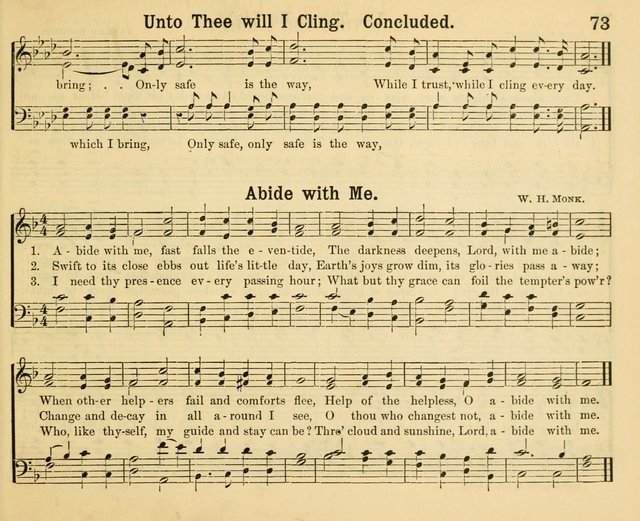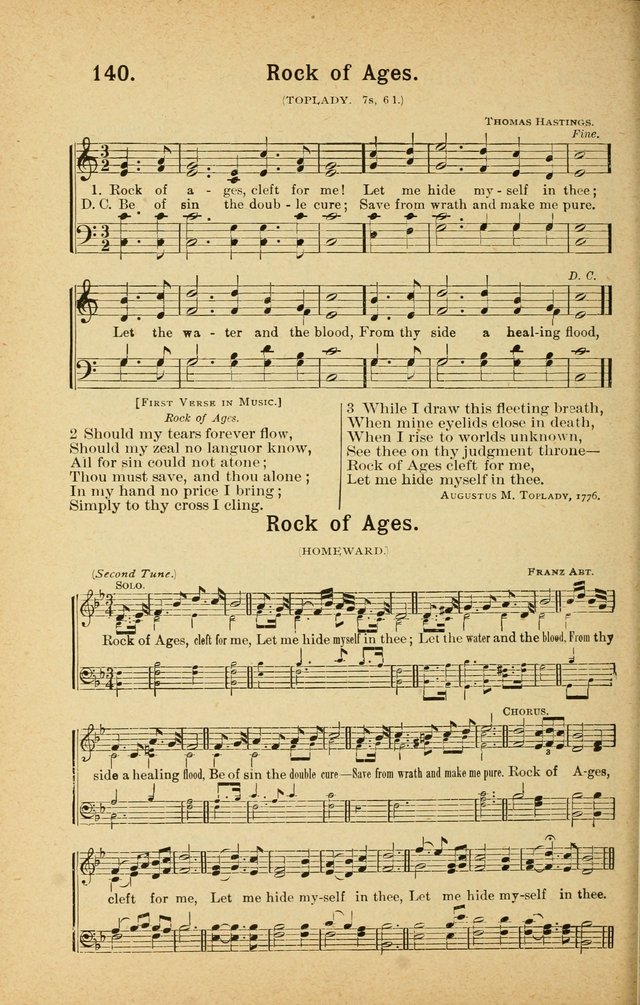Blog
The 50 Greatest Hymns, A-Be S
Friday, May 29, 2020
“ABIDE WITH ME” The title and theme of this hymn come from Luke 24:29 in the KJV, which reads in part, “But they constrained him, saying, Abide with us, for it is toward evening, and the day is far spent.” The author, Henry F. Lyte, takes this literal appeal (the two disciples were offering Jesus hospitality for the night) and transforms it into a prayer for Jesus’ presence through the metaphorical darknesses of our lives: change, temptation, and even death. The tune, EVENTIDE, is a masterpiece of Victorian hymnody. It’s more difficult than most of what we sing, but it suits the mood of the lyrics perfectly.
“ALL HAIL THE POWER OF JESUS’ NAME” Like many hymns, this one is based on the description of Jesus in Revelation 19:12 as a monarch wearing many crowns, which symbolizes His unlimited authority. It invites various groups to acknowledge that authority.
"All Hail the Power of Jesus' Name" sees wider use than similar hymns, such as “Crown Him with Many Crowns” (which is arguably better lyrically), because of the tune. CORONATION is easier to sing, uses some unusual harmony, has a great tenor line, and evokes Baroque-era absolute monarchy. I’m a little surprised that hymnal editors, who love to attribute great hymns to great people on the basis of scant evidence, haven’t credited the tune to Handel instead of its actual composer, Oliver Holden.
“ALL PEOPLE THAT ON EARTH DO DWELL” If worshipers have been singing it since 1560, it’s probably pretty good! The lyrics are a paraphrase of Psalm 100, and it’s easily one of the top three paraphrases in our repertoire. It’s much less clunky than psalm paraphrases usually are because the author took a very short psalm and stretched out the content to make for smoother writing.
The tune, OLD 100TH, is even older than the lyrics. Like many older tunes, it relies on harmony rather than rhythm to add interest, changing chords on nearly every beat. Such tunes can be difficult to sing, but this one isn’t because of the slow tempo at which it is sung and the skill with which the harmony was written. The good “tune math” makes it sound majestic.
“AMAZING GRACE” This is one of those rare birds, a hymn with a mediocre tune that is sung because the lyrics are so good. The tune, NEW BRITAIN, is an import from the Sacred Harp tradition, and it works much better with Sacred Harp-style harmony (For those of you who aren’t familiar with the Sacred Harp version, you can take a listen here: https://www.youtube.com/watch?v=uPOo4dOuPbQ). However, for a hymn about God’s amazing grace, NEW BRITAIN with common-practice harmony simply doesn’t sound very amazing.
The lyrics, though, are amazing. Despite being 250 years old, they are as simple, direct, and clear as if they were written yesterday. If I had to guess, the inspiration for the hymn came from Luke 15:32, and “I once was lost but now am found” was the first line John Newton wrote. Anyone familiar with his life story understands immediately why he would have identified with the prodigal son, and his celebration of the grace that he believed God had extended to him is one in which we all can share.
“BE STILL, MY SOUL” is the masterwork of that gifted translator of German Lutheran hymns into English, Jane Borthwick. The German original, Katherine von Schlegel’s “Stille, Mein Wille” is quite a bit different in meter, rhythm, and tone. Borthwick’s translation is more thoughtful and philosophical. As a hymn for reflection in times of sorrow, “Be Still, My Soul” is unsurpassed.
The tune to which we sing it, FINLANDIA, is much later than the text. It originally was an orchestral tone poem by Finnish composer Jean Sibelius. Its classical genesis is evident in its ultra-boring alto line and ultra-hard bass line. I’m always slightly surprised when I come out on the right note on “remain”! Good tune math helps here too. Singing FINLANDIA congregationally is difficult but doable, and the tune is so beautiful that it’s worth doing.
How Have We Built?
Thursday, May 28, 2020Warren Buffett is fond of saying, “You only find out who is swimming naked when the tide goes out.” In other words, any fool can run a business successfully during a financial boom. However, when the times aren’t so good, foolish risks will be exposed, along with the ones who took them.
The same is true spiritually. Indeed, this is the point that Paul is making in 1 Corinthians 3:10-15. All of us who labor in the Lord’s church are building on the foundation that Paul, along with the other apostles and prophets, laid down. However, not all builders in the church build with equal wisdom and skill. Some are building for eternity; others are building without thought for the future.
When the fires of trial come, though, the quality of each man’s work will be revealed. Every faithful builder will endure, but the product of their labors might not. There are preachers and elders who will inherit eternal life but won’t bring any of those they taught and shepherded with them.
I think the present distress is just such a time of trial, and it will reveal how the workers in each congregation have been building. Most congregations in the United States are either still not assembling or resuming limited assemblies, and it remains unclear how all this will shake out. I’ve seen brethren speculating either gloomily (“Everybody will just start watching the livestream on Sunday morning and not bother to show up!”) or rosily, (“We’ll come back better and stronger then ever!”).
In reality, I think the answer is a great big, “It depends.” Some churches will lose many people; others will lose few to none. A common theme in those disparate results, though, will be the quality of the teaching and leadership the congregation has received before the crisis struck.
It starts with the greatest commandment. People who went to church pre-coronavirus because they loved the Lord with all their heart and soul and mind and strength will be back after the coronavirus has run its course. Devotion to Christ doesn’t sit on the couch and watch YouTube if it has any other choice. On the other hand, people who went to church Sunday mornings because they were used to going might well not be back after they’ve gotten used to not going.
So too with the commandment to love one another as Christ has loved us. Congregations where the relationships between brethren are strong will continue to flourish because those relationships will pull everyone back. The aftermath of the epidemic will change our society in many ways, but people still will be drawn to warmth and kindness. On the other hand, congregations where the relationships between brethren are not warm and strong are going to suffer greatly. If you feel lonely when you go to church, you might as well feel lonely staying home.
How have we built? Have we taught our people to love God and love one another? Have we presented every other commandment as depending on those? Or instead, have we wasted our time on feel-good fluff and trivia? The stakes for having gotten this right are already high. The stakes for getting it right in the future are even higher.
Don't Be an Antipas!
Wednesday, May 27, 2020
The ruler had a lot of respect for God’s prophet. He believed that the prophet was a righteous and holy man. He enjoyed listening to his preaching, and he protected him from harm. After the prophet’s death, the ruler even thought it possible that God might raise him from the dead.
This sounds like a heartwarming story of faith, but in reality, it is anything but. The ruler in question was Herod Antipas, and the prophet was John the Baptist. Though all the above was true, it also was true that Antipas gave the orders for both John’s arrest and his execution.
How do we get from Paragraph 1 to Paragraph 2? How does such a heartwarming story take such a nightmarish turn? The answer lies in the moral weakness of Antipas. Ultimately, his respect and even affection for John were overwhelmed by his flawed character.
These character flaws manifested in Antipas’ life in three main ways. First, though he was entertained by John, he refused to repent in obedience to the truth. John told him that his marriage was unlawful. That certainly made Antipas’ wife, Herodias, murderously angry, but it did not lead Antipas to put her away.
Second, Antipas loved worldly pleasure. The climactic event of the story took place when Herodias’ daughter danced for the king and his guests. Though Mark does not discuss the dance in detail, when we learn that Antipas was willing to surrender half his kingdom in exchange, we don’t have any trouble inferring what kind of a dance it was. The ordinarily shrewd Antipas (Jesus called him a fox, after all) was so inflamed by lust for his own stepdaughter that he made an impulsive, foolish pledge.
Third, Antipas cared more about the good opinion of others than he did about righteousness. He ordered John’s arrest because of pressure from his unlawful wife. Then, when Herodias’ daughter stunned him by asking for John’s head, he was unwilling to appear foolish in front of her and his guests. He was so very, very sorry about it, but he immediately dispatched the executioner who dispatched John.
There are Jezebels in the world, strong-minded people who determinedly pursue evil. However, there are more Antipases. They mean well. They really, really do! However, they shy away from the pain of repentance, they enjoy the passing pleasures of sin, and they care about what their worldly friends think.
Such people often give us hope. They seem receptive to the gospel. They will talk to us about Jesus for as long as we are willing to keep bringing Him up. However, when the time comes for them to change, they change the subject instead.
Antipases often are likeable. Indeed, we may know the temptation to be an Antipas ourselves. However, we must remember that Antipases don’t inherit the kingdom of God. When the chips are down, they don’t do the right thing. They do the wrong thing. Acutely aware of the pain that godliness will bring, they turn a blind eye to the much greater pain that inevitably will accompany lawlessness.
Nobody should be an Antipas. It’s just not worth it.
Love, the Greatest Commandment
Tuesday, May 26, 2020
This year, our congregational theme has been “Living for Jesus”. As a result, much of our preaching and teaching has been focused on the Lord. I think that’s extremely valuable and important. After all, how can we live for Jesus if we don’t know who Jesus is?
This morning, though, I’d like to take a slightly different tack. I want to focus on the “living” part rather than the “Jesus” part. We can’t live for Jesus without knowing who Jesus is, but we can’t live for Him if we don’t know what His expectations are for us either.
As Clay observed last week, though, meeting those expectations can’t merely be a matter of outward form. The Pharisees were masters of check-the-box religion, but the Lord condemned them harshly because of their inward failings. They were willing to offer God 10 percent even of the herbs from their gardens, but what God really wanted was 100 percent of their hearts.
The same is true for us today. If our religion doesn’t come from the heart, it’s worthless. I’d like to preach this morning, then, in response to another one of those sermon requests. Let’s spend some time contemplating love, the greatest commandment.
We need to begin this study by defining WHAT LOVE IS. In this regard, consider Paul’s words in Romans 13:8-10. To some, it might seem surprising that we need to begin this study with a definition. After all, even small children know what love is and tell their mothers “I love you!”, right?
The thing is, though, that our definitions of love don’t necessarily line up with God’s definition. God is love, and He never is deceived about what truly is loving. That’s not true for us, though. We are prone to being deceived by others and even deceiving ourselves. As a result, we may sincerely believe that our conduct is loving when in God’s eyes, it isn’t loving at all. Indeed, people have done great evil in the name of loving God and loving their neighbor.
We think we know what love is, but we don’t. In order to help us, then, God gave us His definition of love. That’s really what the Bible is. Every commandment in the law of Christ is an expression of love, either for God or for our neighbor.
Sometimes, people get this wrong. They say, “My heart is filled with love, so getting all those tiny things right in God’s law doesn’t matter.” That’s exactly backwards. Our hearts are not so good that we get to sit in judgment on the word of God and decide which parts are important for us to keep. Instead, we must allow God’s word to sit in judgment on our hearts, to highlight all the places where we fall short of His perfect love.
Indeed, the more difficult, even outrageous, we find God’s commandments, the more important this becomes. I know people who have serious problems with the Bible’s condemnation of the practice of homosexuality. However, their outrage doesn’t highlight a problem with the Bible. It highlights a problem with them. God’s word is perfect. We aren’t. We need to be humble before it and live accordingly.
Second, we must understand WHY LOVE MATTERS. Here, let’s consider the encounter between Jesus and the scribe in Matthew 22:34-40. A lot of the time, we think that calling love the greatest commandment was a new teaching from Jesus. It wasn’t. In fact, whenever we see somebody in the gospels asking Jesus what the greatest commandment is, it’s because they know the right answer and are checking to see whether He does.
Jesus calling love the greatest commandment in v. 38, then, isn’t the new, intriguing part. Instead, it is when He reveals in v. 40 that all the Law and the Prophets depend on love. Some translations here say that on love hang all the Law and the Prophets, and I think that highlights the function that love serves.
Imagine, then, that love is like a peg or a hook on a wall, and you’ve got a bunch of things hanging from that peg—depending from it, if you will. If you remove that hook, if you take out that peg, all of those things are going to fall to the floor in a heap.
If you take the animating principle of love out of God’s law, the same thing is going to happen. Yes, every commandment was handed down to us as part of God’s definition of love, but it is equally important that we use those commandments as ways to express our love for God and others. If we forget about love, our failure will ruin our obedience.
In fact, this is exactly what happened to the Pharisees. They thought they were keeping the Law, but they forgot about love, and as a result, rather than expressing love, their selective Law-keeping expressed self-righteousness, hypocrisy, and hard-hearted contempt for others. The same thing can happen to us. A Christian without love is nothing more than a Pharisee.
Finally, let’s examine WHAT LOVE LOOKS LIKE. Look at 1 Corinthians 13:4-7. This is a familiar passage. Clay read it during his sermon last week. It’s commonly used during weddings. Everybody thinks it’s so poetic and beautiful and heartwarming and all the rest of that stuff. The thing is, though, that we only can take it so lightly when we don’t think about what it’s actually saying and how it applies to us. Once we start thinking that way, rather than being beautiful and heartwarming, this is a text that becomes painful and humbling.
To illustrate this, let’s spend a few moments considering the coronavirus edition of 1 Corinthians 13. Over the past six weeks or so, many of us have found ourselves spending more time with our families—our loved ones—than we ever have before. During that time, how have we honored God’s ideal of love?
Love is patient. Over the past six weeks, have we always been patient, even when one of our kids wakes up on the mouthy side of the bed one morning? Love is kind. Have we always been kind to our spouses, even when we’ve been tripping over each other for the past six weeks?
Love is not arrogant. Have we been arrogant? Have we demanded things from our families that we have no right to expect? Love is not rude. Are we ever rude to our loved ones? Love is not self-seeking. Do we ever, just for the tiniest little moment, get fed up with serving our families and start wondering when someone is going to do for us instead?
Love is not irritable. Are we? Do we sometimes wake up on the wrong side of the bed ourselves and make sure everybody knows about it? Love does not keep a record of wrongs. Do we? Have we spent our quarantine making a little list of everybody’s shortcomings and failings, until finally we blow our stack about them?
I could go on, but I think that makes my point. Is there any Christian here who is willing to testify that they’ve been perfectly loving during isolation? I don’t know about the rest of you, but I can’t make that claim. When it comes to love, all of us have got a lot of repenting to do, and a long way to go before we become like Jesus.
Lessons from the Greatest Hymn List
Friday, May 22, 2020
Last week, I posted my take on what the 50 greatest hymns of all time were, and I revised the list a few days later. Though the exercise was interesting in itself, I think the process generated some lessons that were even more interesting. I think they are as follows:
ALL HYMNS ARE NOT CREATED EQUAL. The unspoken assumption behind my compilation of the list, an assumption shared by the hundreds of Christians who interacted with me on the various threads about it, is that hymns are not all the same, and that the differences between them matter. To put things another way, there is such a thing as a good hymn, so there necessarily must be such a thing as a bad hymn.
Whenever I posit the latter online, I invariably get pushback from somebody who insists that a hymn cannot be bad unless it teaches false doctrine. In a sense, I suppose that’s true. A poorly written, low-content hymn does not directly send people to hell, any more than a sermon that’s a stand-up comedy routine or a Bible class that’s about pop psychology does.
However, most brethren will critique the pulpit comic and the pop-psychologist Bible-class teacher not for what he says, but for what he does not say. The same critique applies with equal force to bad hymns. It’s not enough for a hymn not to be actively harmful. It must be actively helpful. It must present the worshiper with meaningful spiritual content (the more the better) in a usable form, because all of us need all the help we can get.
OLDER IS BETTER. When I revised my list, I replaced the four most-critiqued hymns on the list with the four whose absence was most lamented. The oldest hymn that I removed was more recent than the most modern hymn I added. Indeed, three of the four additions (“O Thou Fount of Every Blessing”, “Rock of Ages”, and “Amazing Grace”) hailed from the eighteenth century, and two of the hymns I removed came from the twentieth century.
I was not surprised. As a rule, the older a hymn in our repertoire is, the better it is. This is not because all the hymns written in the eighteenth century were good, or even because most of them were good. It’s because the less-than-excellent ones have been eliminated by successive generations of song leaders and hymnal editors with all the ruthlessness of a farmer shooting rats in a barn. Bad old hymn? Mediocre old hymn? Bang! Dead.
This should call today’s hymnal editors, CD compilers, slide-deck creators, and song deacons to caution in adding to the repertoire. Most new hymns and praise songs today are not good either, and when we shove aside the great hymns of the past to make room for them, the quality of our song worship suffers. There are hymns that deserve to be added (“In Christ Alone” is a shining example here), but there are not nearly as many of them as many brethren think.
POP HYMNS DON’T MEASURE UP. Because this was my list, the most heavily represented category was nineteenth-century American gospel hymns. Mostly, nobody complained about that. Compared to our repertoire, the most under-represented category was 20th-century Southern gospel hymns, the hymns of the radio era. Only two of the hymns on my list were written in true Stamps-Baxter quartet style, “This World Is Not My Home” and “Victory in Jesus”. “Victory in Jesus” endured significant critique, to the point where I reasonably could have cut it instead of “Teach Me Thy Way”, which was my fourth strike. Nor did I sense much of a groundswell of support for adding more Southern gospel hymns to the list.
Those hymns were the first to come from an era of mass-media performance. Everybody in the South listened to gospel quartets over the radio back in the day, and those songs transformed the repertoire of churches of Christ. I would estimate that half or more of the hymns in Sacred Selections are from this genre.
Today, though, the Stamps-Baxter hymns are dropping rapidly from use. Now that they are no longer culturally relevant, their true colors have been revealed. Worship progressives and conservatives alike attack them for being old-timey, hokey, shallow, and not very meaningful. Indeed, in the comments on my list of good hymns, several brethren took advantage of the opportunity to poke at hymns not on the list that they didn’t like. Every one of the hymns so marked was a radio hymn.
This should teach us to beware of succumbing to the allure of cultural relevance today. There are plenty of hymns (though their adherents prefer to call them “praise songs”) written in the style of modern pop music that currently are elbowing their way into the repertoire. As was true for radio hymns, this transition often is difficult because such songs are written for performers and then adapted rather than having been created for the congregation. Their kinship to their Stamps-Baxter cousins also often appears in their shallow, repetitive content.
Such songs appeal more to the zeitgeist than to the spirit. 100 years from now, when someone who hasn’t even been born yet compiles a Top 50 Hymns list, not many of them will appear on that list either. Hymns like “When I Survey the Wondrous Cross” will continue to be beloved, but today’s hit singles will seem dated, old-fashioned, and irrelevant—just as Southern gospel hymns increasingly do now.
Some may be fine with the idea of a disposable worship repertoire. I’m not, especially when so many older hymns are worthy of use today. It’s like dumping Grandma’s china on the curb and eating Thanksgiving dinner off of paper plates. There are people who do that too, but I don’t think I’m alone in believing they’ve lost touch with something important.



